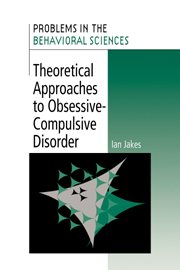Book contents
- Frontmatter
- Contents
- Dedication
- Synopsis of Theoretical approaches to obsessive-compulsive disorder
- Acknowledgments, and provenance of Theoretical approaches to obsessive-compulsive disorder
- 1 The natural history and definition of obsessive-compulsive disorder
- 2 Behavioural/learning accounts of OCD
- 3 Accounts of OCD based upon personality theories derived from the work of Pavlov
- 4 Janet on OCD
- 5 Psychodynamic approaches to OCD
- 6 Cognitive style/deficit approaches to OCD
- 7 Biological approaches to OCD
- 8 Concluding remarks
- References
- Author index
- Subject index
8 - Concluding remarks
Published online by Cambridge University Press: 07 May 2010
- Frontmatter
- Contents
- Dedication
- Synopsis of Theoretical approaches to obsessive-compulsive disorder
- Acknowledgments, and provenance of Theoretical approaches to obsessive-compulsive disorder
- 1 The natural history and definition of obsessive-compulsive disorder
- 2 Behavioural/learning accounts of OCD
- 3 Accounts of OCD based upon personality theories derived from the work of Pavlov
- 4 Janet on OCD
- 5 Psychodynamic approaches to OCD
- 6 Cognitive style/deficit approaches to OCD
- 7 Biological approaches to OCD
- 8 Concluding remarks
- References
- Author index
- Subject index
Summary
Introduction
The standard diagnostic criteria for OCD have been challenged, and an alternative analysis has been proposed that suggests that no single feature or collection of features is both common and peculiar to all instances of the disorder. Consistent with this position, it was also argued that there is no single way in which OCD may be distinguished either from phobias or from delusional states; and various ways in which OCD may be so distinguished were presented.
The difficulties encountered by the theoretical approaches to OCD that have been reviewed are perhaps more striking than their successes, at least if one attempts to regard any of these approaches as providing a full explanation of the disorder. Nonetheless, some of the accounts that have been considered certainly offer observations and suggestions that concern some OCD patients and that may well be of importance to any valid account of these patients’ psychopathology that eventually emerges. The following observations have been presented as being of possible theoretical importance to an explanation of OCD:
OBSERVATION (1) Evolutionary influences may have a role in selecting the content of some OCD symptoms (stressed by some behavioural writers and some of the Pavlovian personality theorists).
OBSERVATION (2). The basal ganglia (among other possible biological factors) may have a role in producing at least some cases of OCD.
OBSERVATION (3). A neurotic temperament is displayed by many OCD patients (stressed by the Pavlovian personality theorists).
OBSERVATION (4). OCD is co-morbid with certain other disorders (stressed by both the Pavlovian personality theorists and Janet's account).
[…]
- Type
- Chapter
- Information
- Theoretical Approaches to Obsessive-Compulsive Disorder , pp. 151 - 165Publisher: Cambridge University PressPrint publication year: 1996



